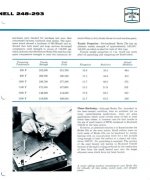steveonmars
Plastic
- Joined
- Dec 26, 2019
I need to make some dies for a couple small punch presses I just bought. The presses are half ton bench top models so not a lot of pressure. What the dies are for is bending 1/4" mild steel wire. The dies will be approx. 3" on all sides with mounting flanges and grooves cut into them for bending the wire into different shapes. I can make the dies with no problem but I don't know what would be the best steel to use. I'm not really set up to do the heat treating myself unless it's very simple so I'll probably find someone locally to do that unless you guys have something better. I don't see why the dies need to be heat treated all the way through so I think just having them case hardened will work for what I'm using them for but I don't know what option will be not only best but cost effective (small home shop, small budget). Any advice would be appreciated.
Thank you
Thank you





